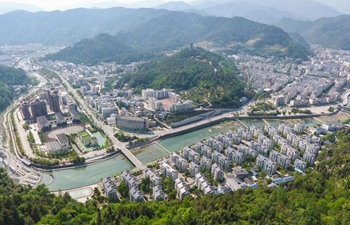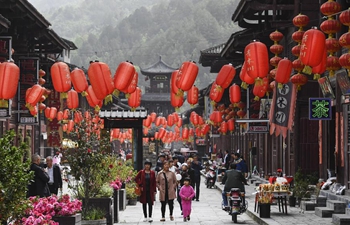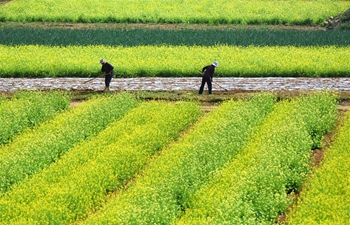BUENOS AIRES, May 11 (Xinhua) -- A factory in southern Buenos Aires has been keeping the ancient art of handblown glassware alive since 1947.
The El Progreso cooperative, located in the district of Ezpeleta, forgoes modern mass production techniques in favor of the kind of painstaking craftsmanship that is rare in the world.
Using glassblowing techniques in use for thousands of years, the factory produces everything from champagne flutes to chandeliers, perfume bottles, vases and candleholders, shipping to clients around the nation and in neighboring South American countries, as well as the United States.
"The work is completely artisanal, handmade," Raul Ferreyra, a member of the cooperative, told Xinhua during a recent tour of the factory.
"This cooperative turned 71 on April 20. We never changed the system, we work with a blowpipe and pincers, everything is blown by mouth, very, very manually," said Ferreyra.
At a time when automation was on the rise in the 1940s, a group of glassworkers from the historic Riogolleau factory near Berazategui, a town in Buenos Aires province, decided to preserve the techniques of their craft, which had been perfected and passed down from generation to generation.
"As in all trades and professions, some take many years (to learn) and others are Maradona and learn faster," explained Ferreyra.
"You learn a craft through practice, you don't need to have studied. By practicing every day, you can become a glassblower," he said.
"Many say 'glass runs through my veins'. You have to like it (because) it's a challenge," he added.
Today, El Progreso's main competition remains mechanization.
"It's tough for us to compete against machines, due to their quantity and speed, but we try to compete with the quality of the glassware," said Ferreyra.
"We have a formula with which we get very good glass. The automated companies also make very good glass, we're even, but we additionally try to make a delicate, fine quality product, to compete for the market in that aspect," he said.
Like mechanized factories, they have strict quality control in place, so any pieces with imperfections are broken and thrown back into the glass furnace, which weighs nearly 30,000 kilos and can reach temperatures of 1,400 degrees Centigrade.
Since the cooperative doesn't rely on an assembly line for mass production, the business can easily make customized items.
"We make items to order. We have lots of clients who bring the mold and we make the product exclusively for them," said Ferreyra.
Business is sometimes brisk, and sometimes slow, "so our problem is always the fixed costs, since we use the same amount of gas, and when there's less work it puts us in a bind, because the (utility) bill is the same and you can't pass it on to the price of the product," added Ferreyra.
With utility prices on the rise in Argentina and the domestic market opening up to more imports, the panorama looks challenging, but El Progreso is going "to put up a fight with the added value" of offering a unique handmade product, he said.

















